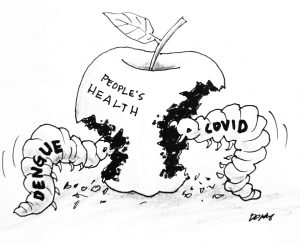While people continually adhere to the protocols of COVID-19 pandemic, we tend to forget that, being a rainy season, now is also the time when cases of dengue fever are on the rise among many communities.
As has been explained repeatedly by health authorities, dengue fever is caused by the bites of mosquitoes carrying the dengue virus. These mosquitoes do not breed in dirty places, but in rather clean portions where clean water is stored. Hence, we do not expect these insects to emerge from smelly and filthy canals, but from concave objects that contain water in them.
Unfortunately, such containers abound everywhere, especially among residential houses. Small containers such as empty cans and bottles that can hold water are potential breeding and hatching grounds for these dengue-causing mosquitoes. Even inside the homes, where ornamental plants are kept by ladies at home, can be suitable homes for the eggs and larvae of these mosquitoes.
It doesn’t take many bites for one to catch this disease—one is potential enough. That is why many households have dengue patients right now. The disease starts with a stubborn fever that lasts for days, accompanied by severe headaches, and muscle and joint pains. Later, the patient succumbs to vomiting and stomach pains. If untreated, the patient will end up dehydrated, with blood coming out of the nose, mouth, ears, eyes, and even skin.
It’s good to have our eyes on the ongoing Covid virus, but we should not also ignore the fatal effects of dengue fever. Prevention is one key—eliminate all those water containers in and outside the house. Avoid mosquito bites by applying anti-mosquito lotion when doing something outside. But if symptoms start to show up, seek medical treatment right away, making sure water and fluid intake are plentiful.




